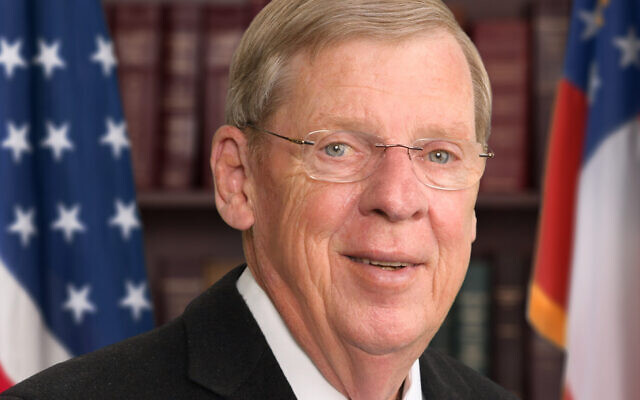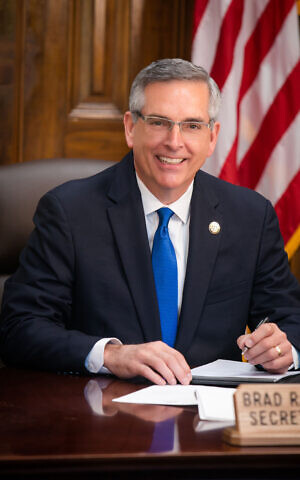Election Day is Near
Take a deep breath when the polls close, as record numbers of absentee ballots in Georgia mean some races are not decided Tuesday night.
Dave Schechter is a veteran journalist whose career includes writing and producing reports from Israel and elsewhere in the Middle East.
By now you’re tired of the incessant television and radio advertisements. Tired of the back-and-forth barbs between the candidates and their surrogates. Tired of panels of talking heads on television. Tired of the debates, or whatever they were. Tired of the yard signs littering the neighborhood.
For you, Election Day cannot come soon enough. It will all be over soon, right? Maybe, maybe not.
There are more than 7.58 million registered voters in Georgia. By Oct. 25, some 2.75 million — more than one in every three – had voted, either by absentee ballots (35 percent) or during in-person early voting (65 percent) that ends Oct. 30.
Four years ago, a record 76.5 percent of Georgia’s registered voters cast ballots in the presidential election. This year’s turnout might rival that figure.

As of Oct. 25, more than 3.52 million Georgians had requested absentee ballots for 2020’s general election. The data suggests that a significant number of people who applied for and received absentee ballots decided instead to vote early in-person and surrendered their absentee ballot when they went to vote.
If you still plan to vote by absentee ballot, hurry up; ballots must be in the hands of county election officials by 7 p.m. Nov. 3.
If you plan to vote on Election Day, some 2,400 polling places statewide will open at 7 a.m. and close at 7 p.m., unless they remain open longer to accommodate voters waiting in lines. The Atlanta Journal-Constitution crunched the numbers from the June 9 primary and reported that 11 percent of polling stations stayed open at least an hour past 7 p.m., at a significantly higher rate in precincts with a majority African American population.
To avoid a repeat of problems that plagued the primary and made Georgia an object of ridicule, the state hoped to hire more than 25,000 poll workers – many younger than usual, as the threat of COVID-19 caused many seniors to back out – increase the number of voting machines statewide to 34,000, and bring in more technical support staff.
Nov. 3 will be the largest test of the state’s new $104 million voting machines, manufactured by Dominion Voting Systems, which are designed to back up the computer screens with a paper trail, a system that critics say remains open to tampering. A federal judge found some claims made by election integrity activists to have merit but rejected a request that the state be barred from using the machines and instead use hand-marked paper ballots.

Those voting on Election Day may notice people wearing labels that identify them as an “official poll watcher.” These folks, usually tasked by the political parties, are registered with the election offices and can observe the process inside a polling station but are not allowed to interact with voters. They can’t use video cameras or cellphones to record people voting or poll workers doing their job. Depending on local rules, they can raise any issues with poll workers or election officials. The parties also may designate people to watch the vote counting process. They can monitor, but not interact with the people counting votes, addressing any issues with election officials.
The Republican Party, in particular, has mounted an extensive effort, hoping to put some 50,000 people in this role into polling places nationally. A federal court decree that had blocked Republicans from such efforts since 1982 because of findings that the party had engaged in voter suppression efforts against minorities in New Jersey, was lifted by a federal judge, effective at the end of 2018.
On the night of Nov. 3, the results you’ll see reported first likely will be from votes cast that day or during early in-person voting. Be wary of those numbers.
The state allows the counties to begin processing absentee ballots two weeks before Election Day — but they cannot be counted until Election Day. The idea is that opening the envelopes, taking out the ballots, and gathering together will speed up the counting process.
“We have been accustomed to learning the results of an election on election night, or at least in the wee hours of the morning after Election Day,” said Atlanta attorney Marc Hershovitz, whose resume includes work with political candidates and campaigns. “As anyone who has ever come home from a long vacation to find a large pile of mail knows, processing a large volume of mail takes time. In past elections, the percentage of people voting by absentee ballot has been small. But in 2020, because of the pandemic, there is a massive number of people voting by absentee ballot. Counting those votes will take time.”
And with perhaps 2 million or more Georgians voting by absentee ballot and the hours that will be needed to count those ballots, the outcome of some races may not be known until Wednesday. Or Thursday. Or Friday.

The state gives the counties 10 days, until Nov. 13, to certify results and Secretary of State Brad Raffensperger, a Republican, has until Nov. 20 to put the state’s stamp of approval on the numbers. Georgia does not automatically recount votes in close races. Candidates may request a recount, paid for by the state, within two days of county certification, if the margin is less than or equal to 0.5 percent.
In races where no candidate wins a majority of the vote, runoffs for state and local offices will take place Dec. 1 and for federal offices Jan. 5. A runoff is likely in the 21-candidate, open primary to fill the final two years of the term of retired U.S. Sen. Johnny Isakson and is possible in the other Senate race, between incumbent Republican David Perdue, Democratic Jon Ossoff, and Libertarian Shane Hazel.
Readers who remember the term “hanging chad” already have been through a presidential election that ultimately was decided by the Supreme Court of the United States. The Republican and Democratic parties have teams of lawyers who will be standing by Election Day and in the days after, if necessary, if they feel there is a case to make.
There is one thing attorney Hershovitz would like to see. “There is no rule or law that says results have to be announced immediately. But television networks and stations like excitement and drama, and every newspaper wants a banner headline. They are conditioning the public to think that results must be known immediately. If the media were to take a collective deep breath on Election Day and say ‘just go about your days like normal and we’ll let you know what the results are in a week or two after all the votes have been counted,’ we’d all be better served,” he said.




comments